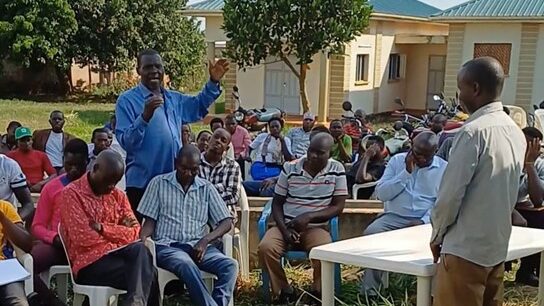
On July 2, 2024, Food Rights Alliance (FRA) conducted a community awareness session on aflatoxin control and management in Kiryandongo District. The event aimed to build civil consciousness among agrifood system actors in Kiryandongo communities on the economic, health, and social impacts of aflatoxin and critical actions for management.
The session, held at Lota Agroprocessors Limited, brought together 100 participants, including farmers, district leaders, buyers, sellers, cooperatives, and agro-processing companies in the maize value chain. Through discussions and dissemination of Information, Education, and Communication (IEC) materials, actors were engaged on the impact of aflatoxin, practices that promote aflatoxin, and existing government programs to advance aflatoxin management.
Key issues discussed included the effects of aflatoxin on farmers’ livelihoods and the national economy, practices that promote aflatoxin in the maize value chain, and actor-led solutions to reducing aflatoxin in agricultural produce. The community awareness session was complemented by a radio talk show at Kibanda FM, which involved discussions with district leaders, extension workers, civil society, and private sector representatives on aflatoxin control measures.
Through the event, awareness was creating and civic consciousness built on aflatoxin control and management among actors in the maize value chain. Community members were able to actively participate and share their experiences which informed key recommendations for improvement. These included utilizing affordable drying alternatives, fast-tracking the development of an ordinance to regulate safety and quality in the maize value chain, establishing labs for soil testing, improving enforcement and provision of quality seed, fighting corruption, and increasing community awareness on aflatoxin. Additionally, the stakeholders recommended implementing integrated pest management practices, enhancing storage facilities and sanitation practices, promoting good agricultural practices, supporting research and development of aflatoxin-resistant crop varieties, and encouraging private sector investment in aflatoxin management. These recommendations aim to address the root causes of aflatoxin contamination and promote a coordinated approach to achieving an aflatoxin-free agrifood system in Uganda.
The community awareness session and radio talk show demonstrated the importance of collaborative efforts in addressing aflatoxin contamination. FRA’s partnership with Kiryandongo district local government, maize value chain actors, and other stakeholders has been instrumental in driving progress in aflatoxin management. As the campaign continues to gain momentum, it is clear that a coordinated approach is essential in achieving an aflatoxin-free agrifood system in Uganda.
For More Details please contact the Secretariat.
By Claire Atukunda
Program Manager, Food Governance
